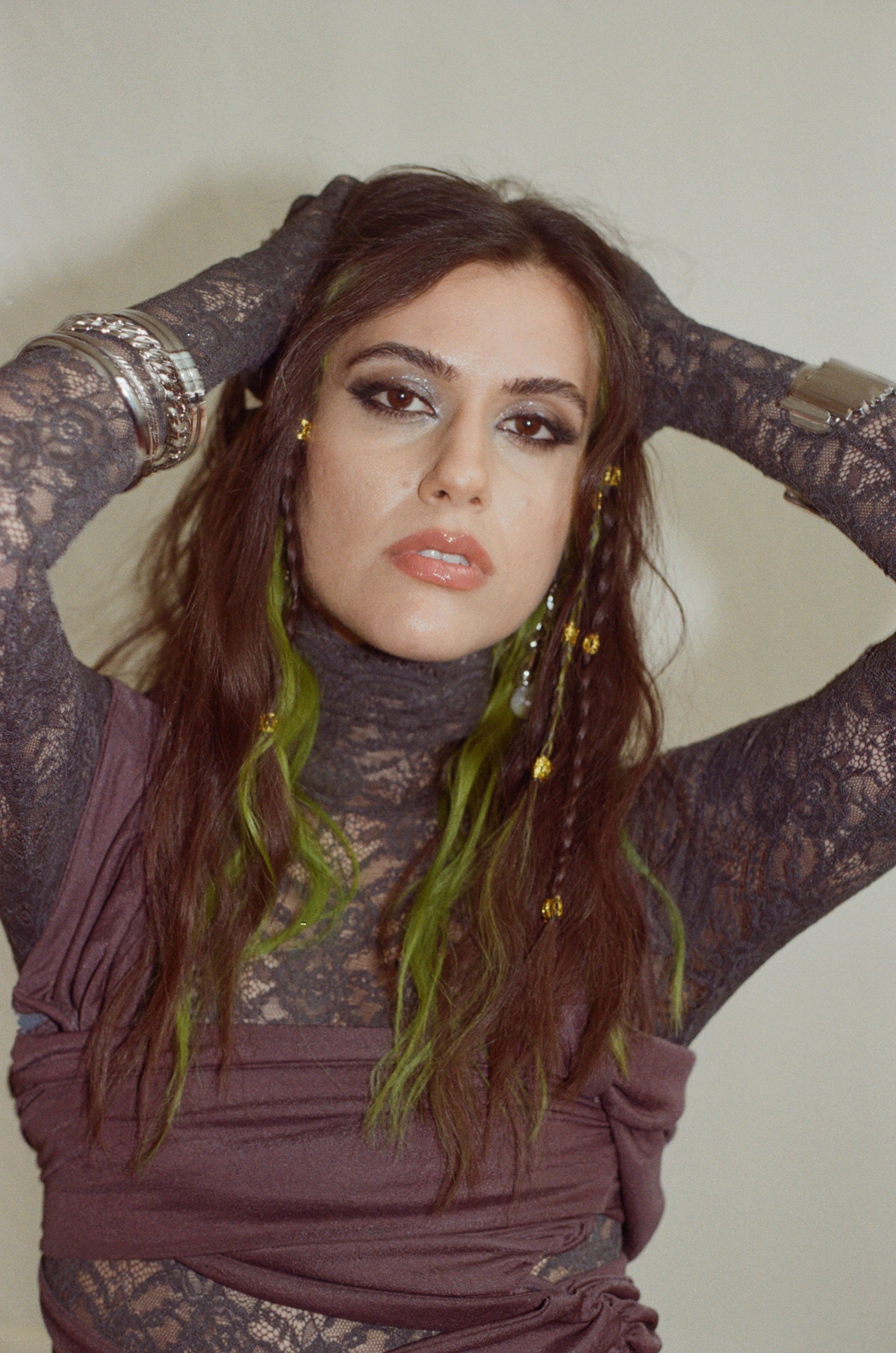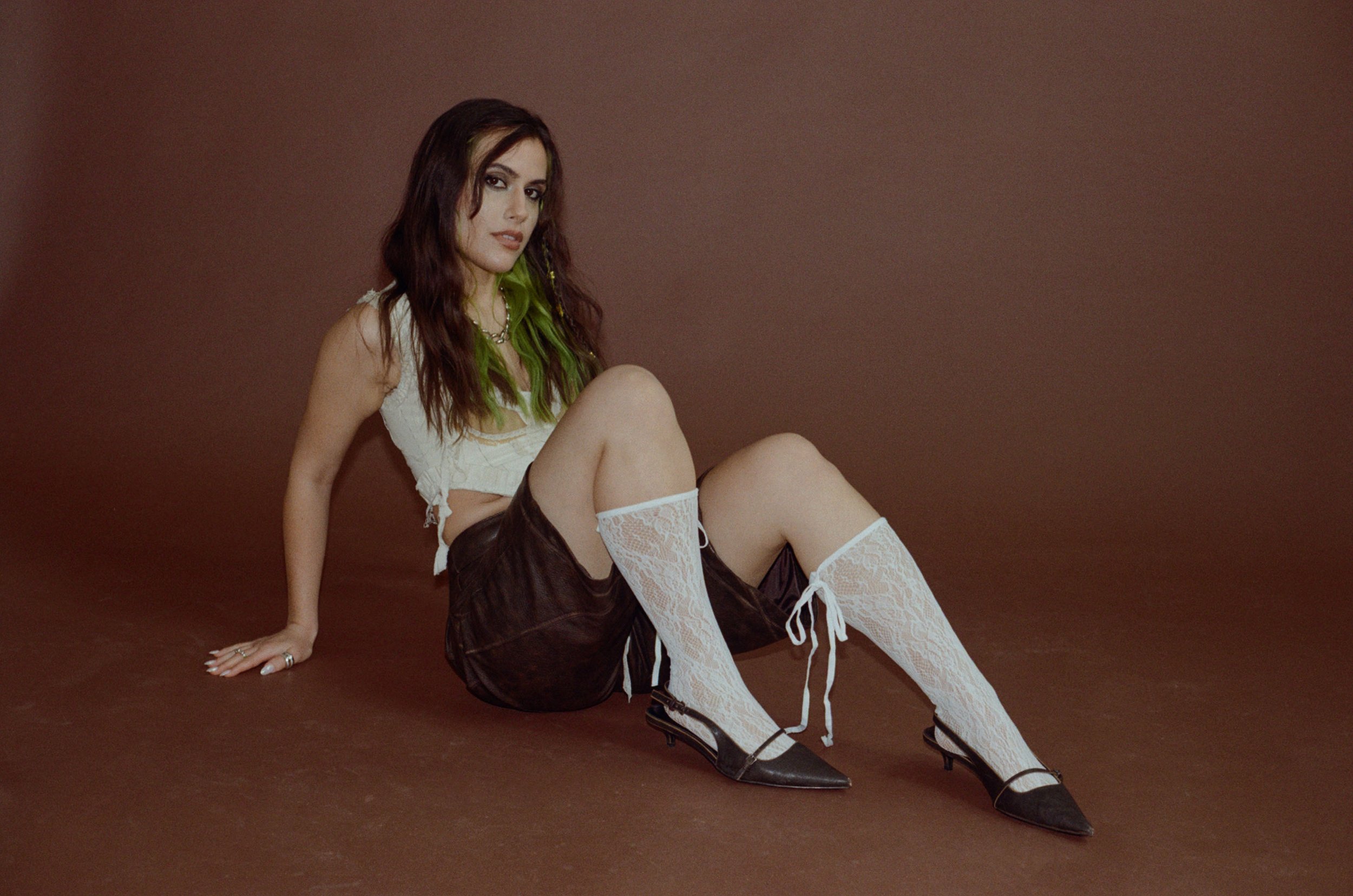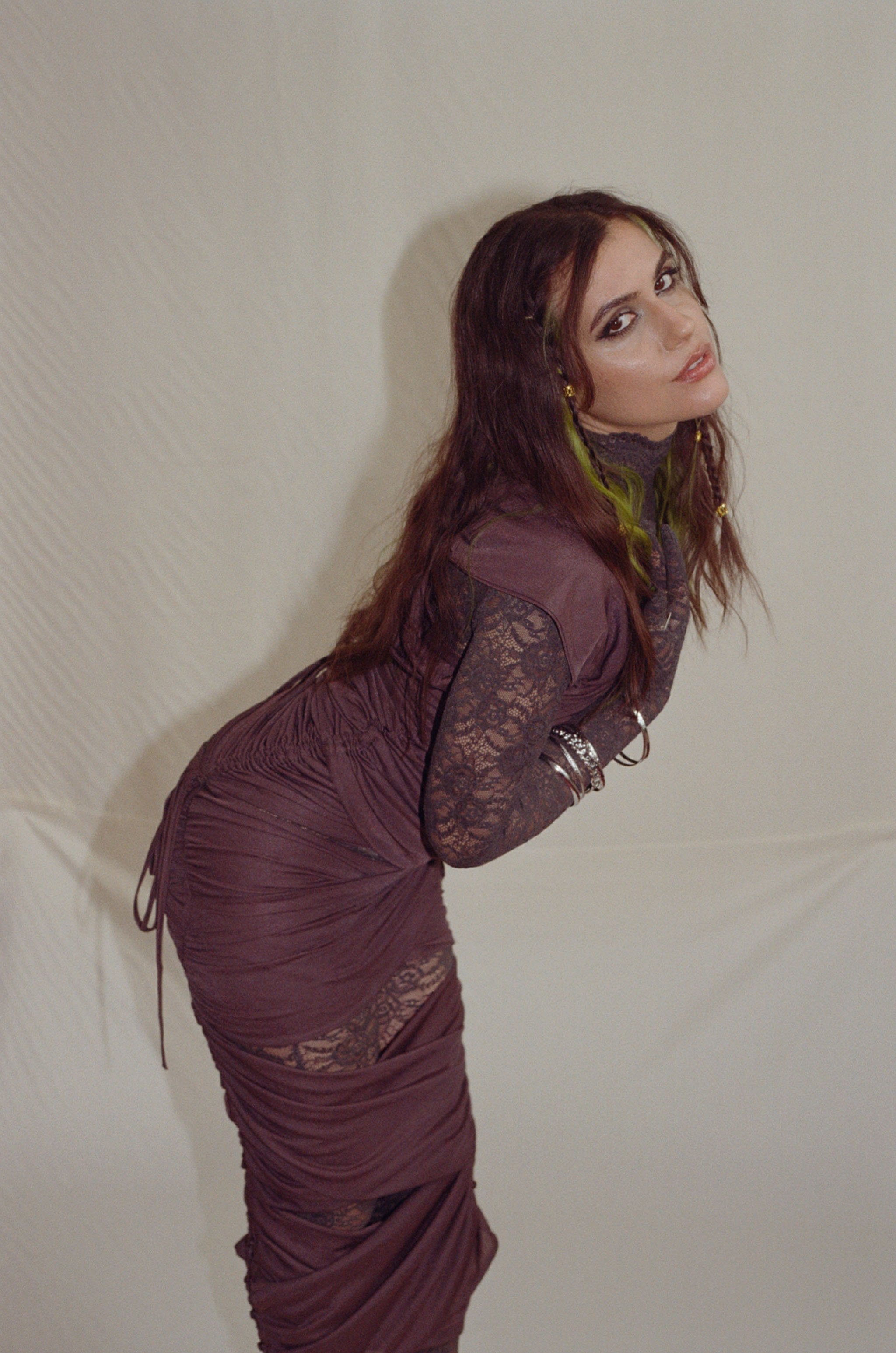Lana Lubany on Embracing Her Heritage, Palestinian Culture and Bilingual Pop
This piece is part of The Jade Issue, a special issue of Polyester guest-edited and curated by Jade Thirlwall. Jade handpicked each of the musicians, activists, writers and it girls in the magazine as an exercise in trying to create the publication she wishes she’d been able to read growing up. Get your copy here!
Photography: Chloe Sheppard | Makeup: Grace Ellington | Hair: Sky Cripps-Jackson | Styling: Katie Bryce | Photography Assist: Lewis Vorn
Make it stand out
Palestinian-American artist Lana Lubany blends Middle Eastern influences with Western sounds. Her breakthrough single, 'THE SNAKE,' went viral in March 2023, racking up nearly seven million Spotify streams. The track is sung in Arabic and English, and the mix is a perfect example of Lubany’s unique musical vision.
Lubany's journey from Palestine to the UK, where she studied music and settled in London, has been marked by a commitment to her heritage and a drive to innovate. She’s known for her compelling performances and stage presence, though as she divulges in the below conversation with Jade, her journey is not just about music. It’s about building community and advocating for change. Here, Lana delves into her creative approach, her passion for activism, and her pride in her Arabic heritage.
Jade Thirlwall: Hi Lana. If you could magically master any instrument overnight, which would you choose? And why?
Lana Lubany: I want to say guitar, but that's basic.
But it opens the door to so many things!
True. I would say Oud.
Corset - Milla Guilia Badin | Leather shorts - Basic Pleasure Mode | Socks and shoes - Stylist’s own | Jewellery - Lag World and stylist’s own
Yes, Arabic Oud. That’s a beautiful Arabic guitar, we studied it during Arabic lessons.
So, so good. There's another instrument called the Qanun. You'd play it with your fingers. It's beautiful. But I'm going to go with Oud.
Your music seamlessly blends English and Arabic sounds, creating a unique fusion that reflects your Palestinian-American heritage. How did you decide to integrate both languages into your songs? And what significance does this bilingual approach have for you?
My mom has always encouraged me to sing in English and Arabic because of my Palestinian heritage. My grandmother, who’s American and from New Jersey, also greatly impacted me, blending different cultural experiences into my life.
For the longest time, I didn't want to sing in Arabic. I didn't think it was something I wanted to do, and I felt like I couldn't be successful singing in Arabic - especially in the Western world, where there were no examples to follow. But a few years ago, I hit a breaking point. I had been trying to find my thing for so long and nothing worked. Then a friend told me about someone looking for a girl who could sing in both languages.
I had to talk myself into it because I didn't think I could, but I wrote my first English-Arabic song, and to my surprise, I ended up liking it. There was something special about it. That experience led me to a path of accepting my identity and discovering who I am. I had to go through the tough times of not being true to myself and watering down my personality and cultural identity, but now I'm so glad I did because it led me to embrace who I am fully. Singing in both languages and doing whatever the fuck I want in my music feels incredibly powerful.
Glasses - Gentle Monster | Dress - SRVC | Shoes - Topshop | Earrings - Stylist’s own | Bracelets - Maison Lumiere and Stylist’s own | Rings - Lag World and stylist’s own
It’s so powerful! Growing up with Arab heritage, I had never heard of or seen that. To see that happening now in the Western world is so incredible. I wish I had that as a little girl. It would have changed my thoughts on myself and music in general. It's incredible what you're doing. As a third culture kid, how do you navigate the duality of your heritage and influences in your music so well. How do you balance these two worlds creatively? And what unique perspectives do you bring to your work?
I find it really enjoyable to be creative in a way that hasn't been done before. It's like working on a blank canvas and I love being in the flow of constantly creating. It's surprising how two seemingly unrelated things can end up meshing together. Authenticity is the key. I will never do something that feels gimmicky or inauthentic to who I am, even if it's related to Arab culture or anything else. I stay true to myself while being open to experimenting and not afraid to be different. I want to do more than just follow trends – I want to do my own thing and create meaningful art.
Representing your homeland through your music is a powerful form of storytelling. How do you approach this responsibility, and what messages or narratives do you hope to convey about Palestine through your songs?
I want to show people what we're really like, the true face of us Palestinians, because we have a beautiful culture and we're such generous, giving people. Everything you see about us in the media is very harmful and sad. My role is very specific to me and to my experiences. There isn't a representation for everyone right now out there in the world. It's really important to me to make people feel they don't have to water down their personalities and backgrounds to fit in. You should be proud of where you're from.
I did that at the start of my career, which I feel sad about now.
I can understand, you felt like you wanted to fit in.
100%. I didn't have any Arab representation and anything I'd seen growing up in Western media was always negative. It scared me to be vocal about who I was in case I got trolled. It made me fearful and I'm really sad about that. Now that I'm later in life, I love to celebrate my heritage. But it's never too late to do that.
You've been a pioneer in representing your culture through your art; what challenges have you faced in this role? And how important is it for you to speak up?
I feel like you don't know someone entirely online. You can't. It's just impossible. And a lot of people are very judgy. They misjudge you based on one thing that you've said or not said, and they don't think about the whole story. Because the internet is so polarising, I've had difficulty navigating social media, especially in the past year.
Dress, veil and cuffs - Ruaa Elmansuri | Pearls and jewellery - Stylists own | Shoes - Topshop
Because people are starting to get to know you better?
Not just that, the political situation has been very difficult for me. I had to step back from social media because I didn't know how to navigate it. But now I know that people are going to judge no matter what.
It's important, especially as a Palestinian artist, for you to protect yourself and your mental health. Have you spoken about the adversity and racism you experienced growing up? If you could go back, what advice would you give your younger self to navigate those challenges?
If I could go back, I would tell my younger self so many things. Being Arab is fucking cool. It's the coolest thing in the world, and you should embrace it. Because I think everybody's hating us because they ain't us. Do you know what I mean?
When I look back now as an Arab woman, I didn't even realise how much pop culture is influenced by our music - like Timbaland. All these artists used our beats and our movements. I looked at it through that lens and was like, ‘Oh, my God, we were there all along.’ People were so into our culture. If I had that perspective back then, things would have been different.
I would tell my younger self not to listen to the narrative that's been so loud in the media for the past years. Because it's all storytelling. I've learned so much about how the media can change the narrative, even if they're lying, which is crazy and scary.
I would tell her to accept herself, which is harder said than done. It’s much cooler to be unique and individual and yourself. It's so corny, but it's so true.
As an artist with a growing platform, you can amplify essential issues and advocate for change. How do you use your voice and music to address topics that are meaningful to you?
I express myself through my art. Everything I write is about my experiences as a unique individual and as a Palestinian. Right now, I don't really write songs about anything else. My music is based on my emotions and experiences, especially about being Palestinian. Whenever something is bothering me, I put it into my music. What I create is deeply connected to my identity as a Palestinian.
What do you see for the future of Arabic artists? Or what do you hope for?
I see Arabic music dominating the mainstream. I see big artists collaborating with Arab artists, which is becoming super global. It’s already happening, which is really cool. I see Arabic music experiencing the same explosion in popularity as Latin music, and it's exciting to be a part of it.









